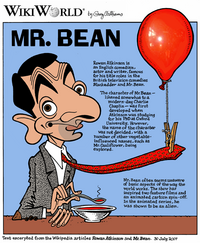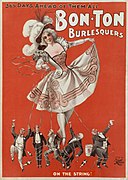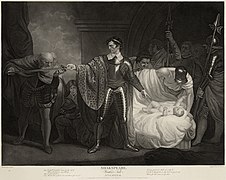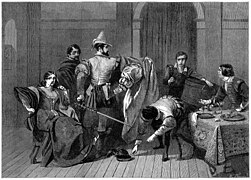Portal:Comedy
The Comedy Portal
Comedy is a genre of fiction that consists of discourses or works intended to be humorous or amusing by inducing laughter, especially in theatre, film, stand-up comedy, television, radio, books, or any other entertainment medium. The term originated in ancient Greece: In Athenian democracy, the public opinion of voters was influenced by political satire performed by comic poets in theaters. The theatrical genre of Greek comedy can be described as a dramatic performance pitting two groups, ages, genders, or societies against each other in an amusing agon or conflict. Northrop Frye depicted these two opposing sides as a "Society of Youth" and a "Society of the Old". A revised view characterizes the essential agon of comedy as a struggle between a relatively powerless youth and the societal conventions posing obstacles to his hopes. In this struggle, the youth then becomes constrained by his lack of social authority, and is left with little choice but to resort to ruses which engender dramatic irony, which provokes laughter.
Satire and political satire use comedy to portray people or social institutions as ridiculous or corrupt, thus alienating their audience from the object of their humor. Parody subverts popular genres and forms, critiquing those forms without necessarily condemning them.
Other forms of comedy include screwball comedy, which derives its humor largely from bizarre, surprising (and improbable) situations or characters, and black comedy, which is characterized by a form of humor that includes darker aspects of human behavior or human nature. Similarly scatological humor, sexual humor, and race humor create comedy by violating social conventions or taboos in comic ways, which can often be taken as offensive by the subjects of the joke. A comedy of manners typically takes as its subject a particular part of society (usually upper-class society) and uses humor to parody or satirize the behavior and mannerisms of its members. Romantic comedy is a popular genre that depicts burgeoning romance in humorous terms and focuses on the foibles of those who are falling in love. (Full article...)
Selected article
Selected picture

A jester, joker, fool, or buffoon is a specific type of entertainer (but not always) associated with the Middle Ages. Jesters typically wore brightly colored clothing in a motley pattern. Their hats, sometimes called the cap ’n bells, cockscomb (obsolete coxcomb), were especially distinctive; made of cloth, they were floppy with three points (liliripes) each of which had a jingle bell at the end. The three points of the hat represent the asses ears and tail worn by jesters in earlier times. Other things distinctive about the jester were his incessant laughter and his mock scepter, known as a bauble or maharoof.
More did you know...
- ...that screenwriter Richard Baer's writing credits for television included twenty-three episodes of Bewitched and five episodes of The Munsters?
- ... that a Saturday Night Live sketch, featuring Amy Poehler and Tina Fey as Hillary Clinton and Sarah Palin respectively, was dismissed by Palin's spokeswoman as "sexist"?
- ... that the 1957–1958 CBS sitcom Dick and the Duchess was one of the few American television series filmed in England?
Selected quote
Selected biography
Did you know (auto-generated)

- ... that when Luna Park opened in 1906, the first program included "comedy sheep"?
- ... that an Irish comedy group wrote the film Apocalypse Clown?
- ... that a story titled "The Adventures of Mr. Stupidhead in Russia" may have influenced the Soviet silent comedy film The Extraordinary Adventures of Mr. West in the Land of the Bolsheviks?
- ... that a 1955 satirical comedy play by Kasymaly Jantöshev was one of the first signs of the relaxation of Soviet literary restrictions after the death of Joseph Stalin?
- ... that the live-action comedy series Community had a stop motion animated Christmas special?
- ... that the proposed third season of teen sitcom Sonny with a Chance was reworked into the sketch comedy series So Random! after the departure of its lead actor Demi Lovato?
Categories
Related portals
Main topics
Terms: Black comedy • Comedian • Comedy club • Comedy of manners • Convention (norm) • Irony • Komos • Parody • Political satire • Race humor • Restoration comedy • Satire • Screwball comedy • Surreal humour • Taboo • Toilet humor
Comedy genres: Bouffon • Comedy film • Anarchic comedy film • Gross-out film • Parody film • Romantic comedy film • Screwball comedy film • Slapstick film • Comic novel • Dramedy • Improvisational comedy • Musical comedy • Stand-up comedy • Alternative comedy • Impressionist (entertainment) • One-liner joke • Comedy genres • Sketch comedy • Television comedy • Radio comedy • Situation comedy • Tragicomedy
History of theatre: Ancient Greek comedy • Ancient Roman comedy • Burlesque • Citizen comedy • Clown • Comedy of humours • Comedy of manners • Comedy of menace • Comédie larmoyante • Commedia dell'arte • Face • Jester • Restoration comedy • Shakespearean comedy • Dadaist/Surrealist • Theatre of the absurd
Comedy events and awards: British Comedy Awards • Canadian Comedy Awards • Cat Laughs Comedy Festival • Edinburgh Festival Fringe • Just for laughs • Halloween Howls Comedy Festival • Melbourne International Comedy Festival • New York Underground Comedy Festival
Lists: List of comedians • List of British comedians • List of Canadian comedians • List of Finnish comedians • List of German language comedians • List of Italian comedians • List of Mexican comedians • List of Puerto Rican comedians • List of Indian comedians • List of British TV shows remade for the American market • List of comedies • List of New York Improv comedians
Featured content
| This is a list of recognized content, updated weekly by JL-Bot (talk · contribs) (typically on Saturdays). There is no need to edit the list yourself. If an article is missing from the list, make sure it is tagged (e.g. {{WikiProject Comedy}}) or categorized correctly and wait for the next update. See WP:RECOG for configuration options. |
Featured articles
 Abby (TV series)
Abby (TV series) Abyssinia, Henry
Abyssinia, Henry Adventure Time
Adventure Time American Beauty (1999 film)
American Beauty (1999 film) Animaniacs
Animaniacs Back to the Future
Back to the Future Bale Out
Bale Out Melanie Barnett
Melanie Barnett The Beautician and the Beast
The Beautician and the Beast The Bill (Inside No. 9)
The Bill (Inside No. 9) Cartman Gets an Anal Probe
Cartman Gets an Anal Probe Nancy Cartwright
Nancy Cartwright Charlie Chaplin
Charlie Chaplin The Chaser APEC pranks
The Chaser APEC pranks The City of New York vs. Homer Simpson
The City of New York vs. Homer Simpson Cold Feet
Cold Feet A Cure for Pokeritis
A Cure for Pokeritis Damien (South Park)
Damien (South Park) The Demi-Virgin
The Demi-Virgin Donald Trump (Last Week Tonight with John Oliver)
Donald Trump (Last Week Tonight with John Oliver) Ed, Edd n Eddy
Ed, Edd n Eddy Eve (American TV series)
Eve (American TV series) Flywheel, Shyster, and Flywheel
Flywheel, Shyster, and Flywheel George Formby
George Formby George Formby Sr
George Formby Sr Fuck (2005 film)
Fuck (2005 film) Ghostbusters
Ghostbusters Ghostbusters II
Ghostbusters II Goodbyeee
Goodbyeee The Grand Budapest Hotel
The Grand Budapest Hotel Grim Fandango
Grim Fandango Groundhog Day (film)
Groundhog Day (film) H.M.S. Pinafore
H.M.S. Pinafore Phil Hartman
Phil Hartman Head over Heels (American TV series)
Head over Heels (American TV series) Homer's Enemy
Homer's Enemy Homer's Phobia
Homer's Phobia Hoodwinked!
Hoodwinked! Kenneth Horne
Kenneth Horne Horrible Histories (2009 TV series)
Horrible Histories (2009 TV series) It's That Man Again
It's That Man Again Hattie Jacques
Hattie Jacques Janet(s)
Janet(s) Joking Apart
Joking Apart The Joy of Sect
The Joy of Sect Kampung Boy (TV series)
Kampung Boy (TV series) Katie Joplin
Katie Joplin Lage Raho Munna Bhai
Lage Raho Munna Bhai Last Gasp (Inside No. 9)
Last Gasp (Inside No. 9) Last of the Summer Wine
Last of the Summer Wine The Last Temptation of Krust
The Last Temptation of Krust John Le Mesurier
John Le Mesurier Dan Leno
Dan Leno Lisa the Vegetarian
Lisa the Vegetarian Little Miss Sunshine
Little Miss Sunshine Love, Inc. (TV series)
Love, Inc. (TV series) Mr. Hankey, the Christmas Poo
Mr. Hankey, the Christmas Poo A Nice Day for a Posh Wedding
A Nice Day for a Posh Wedding North by North Quahog
North by North Quahog John Oliver
John Oliver Our Lady of Perpetual Exemption
Our Lady of Perpetual Exemption Parks and Recreation season 1
Parks and Recreation season 1 Pilot (Parks and Recreation)
Pilot (Parks and Recreation) Press Gang
Press Gang A Quiet Night In
A Quiet Night In R U Professional
R U Professional The Random Years
The Random Years The Riddle of the Sphinx (Inside No. 9)
The Riddle of the Sphinx (Inside No. 9) Road to the Multiverse
Road to the Multiverse Rob-B-Hood
Rob-B-Hood George Robey
George Robey Round the Horne
Round the Horne SLAPP Suits
SLAPP Suits Judy Ann Santos
Judy Ann Santos Sardines (Inside No. 9)
Sardines (Inside No. 9) School Rumble
School Rumble Peter Sellers
Peter Sellers Bart Simpson
Bart Simpson Homer Simpson
Homer Simpson The Simpsons Movie
The Simpsons Movie The Simpsons
The Simpsons Red Skelton
Red Skelton South Park season 13
South Park season 13 Stark Raving Dad
Stark Raving Dad Starvin' Marvin
Starvin' Marvin Stephen Colbert at the 2006 White House Correspondents' Dinner
Stephen Colbert at the 2006 White House Correspondents' Dinner A Streetcar Named Marge
A Streetcar Named Marge Tank Girl (film)
Tank Girl (film) Temperatures Rising
Temperatures Rising Terry-Thomas
Terry-Thomas Trading Places
Trading Places Treehouse of Horror
Treehouse of Horror Tropic Thunder
Tropic Thunder A Very Merry Unauthorized Children's Scientology Pageant
A Very Merry Unauthorized Children's Scientology Pageant Volcano (South Park)
Volcano (South Park) Weight Gain 4000
Weight Gain 4000 P. G. Wodehouse
P. G. Wodehouse You Only Move Twice
You Only Move Twice
Featured lists
 30 Rock season 1
30 Rock season 1 30 Rock season 2
30 Rock season 2 30 Rock season 3
30 Rock season 3 30 Rock season 4
30 Rock season 4 Bookseller/Diagram Prize for Oddest Title of the Year
Bookseller/Diagram Prize for Oddest Title of the Year Ian Carmichael on stage, screen and radio
Ian Carmichael on stage, screen and radio Carry On series on screen and stage
Carry On series on screen and stage Charlie Chaplin filmography
Charlie Chaplin filmography Desperate Housewives season 1
Desperate Housewives season 1 List of accolades received by Despicable Me 2
List of accolades received by Despicable Me 2 List of Family Guy cast members
List of Family Guy cast members Family Guy season 1
Family Guy season 1 Family Guy season 4
Family Guy season 4 Family Guy season 5
Family Guy season 5 Family Guy season 8
Family Guy season 8 George Formby on screen, stage, record and radio
George Formby on screen, stage, record and radio GLAAD Media Award for Outstanding Comedy Series
GLAAD Media Award for Outstanding Comedy Series Glee season 1
Glee season 1 List of accolades received by Gosford Park
List of accolades received by Gosford Park Green Wing series 1
Green Wing series 1 How I Met Your Mother season 1
How I Met Your Mother season 1 Hattie Jacques on stage, radio, screen and record
Hattie Jacques on stage, radio, screen and record John Le Mesurier on stage, radio, screen and record
John Le Mesurier on stage, radio, screen and record List of Arrested Development episodes
List of Arrested Development episodes List of Community episodes
List of Community episodes List of Eve (American TV series) episodes
List of Eve (American TV series) episodes List of Family Guy episodes
List of Family Guy episodes List of Joking Apart episodes
List of Joking Apart episodes List of QI episodes
List of QI episodes List of The Office (British TV series) episodes
List of The Office (British TV series) episodes List of The Simpsons Treehouse of Horror episodes
List of The Simpsons Treehouse of Horror episodes List of Yotsuba&! chapters
List of Yotsuba&! chapters List of awards and nominations received by Arrested Development
List of awards and nominations received by Arrested Development List of awards and nominations received by BoJack Horseman
List of awards and nominations received by BoJack Horseman List of awards and nominations received by Bob's Burgers
List of awards and nominations received by Bob's Burgers List of awards and nominations received by Community
List of awards and nominations received by Community List of awards and nominations received by John Oliver
List of awards and nominations received by John Oliver List of awards and nominations received by Louie
List of awards and nominations received by Louie List of awards and nominations received by Modern Family
List of awards and nominations received by Modern Family List of awards and nominations received by Parks and Recreation
List of awards and nominations received by Parks and Recreation List of awards and nominations received by Psych
List of awards and nominations received by Psych List of The Office (American TV series) episodes
List of The Office (American TV series) episodes The Office (American TV series) season 1
The Office (American TV series) season 1 The Office (American TV series) season 2
The Office (American TV series) season 2 The Office (American TV series) season 3
The Office (American TV series) season 3 The Office (American TV series) season 4
The Office (American TV series) season 4 The Office (American TV series) season 8
The Office (American TV series) season 8 List of awards and nominations received by Penn & Teller: Bullshit!
List of awards and nominations received by Penn & Teller: Bullshit! List of Press Gang episodes
List of Press Gang episodes Radio Times's Most Powerful People
Radio Times's Most Powerful People Seinfeld season 2
Seinfeld season 2 Seinfeld season 3
Seinfeld season 3 Peter Sellers on stage, radio, screen and record
Peter Sellers on stage, radio, screen and record The Simpsons shorts
The Simpsons shorts List of The Simpsons episodes (season 21–present)
List of The Simpsons episodes (season 21–present) List of The Simpsons episodes (seasons 1–20)
List of The Simpsons episodes (seasons 1–20) The Simpsons season 1
The Simpsons season 1 The Simpsons season 2
The Simpsons season 2 The Simpsons season 3
The Simpsons season 3 The Simpsons season 4
The Simpsons season 4 The Simpsons season 5
The Simpsons season 5 The Simpsons season 6
The Simpsons season 6 The Simpsons season 7
The Simpsons season 7 The Simpsons season 8
The Simpsons season 8 The Simpsons season 9
The Simpsons season 9 Songs, sketches and monologues of Dan Leno
Songs, sketches and monologues of Dan Leno Tenacious D discography
Tenacious D discography Terry-Thomas on screen, radio, stage and record
Terry-Thomas on screen, radio, stage and record Primetime Emmy Award for Outstanding Voice-Over Performance
Primetime Emmy Award for Outstanding Voice-Over Performance
Featured pictures
-
Bon-Ton Burlesquers2
-
Busterkeaton edit
-
George Grossmith as Reginald Bunthorne in Gilbert and Sullivan's Patience (1881)
-
George Romney - William Shakespeare - The Tempest Act I, Scene 1
-
John Opie - Winter's Tale, Act II. Scene III
-
Lonesome (1928)
-
Magistrate 1885 - Weir Collection - Restoration
-
Midsummer Night's Dream Henry Fuseli2
-
Safety Last (1923)
-
Taming of the Shrew
-
The Freshman
-
The General (1926)
-
The High Rollers Extravaganza Co. - Bend Her - c.1900
-
Utah Desert Monolith
-
W. S. Gilbert - Alice B. Woodward - The Pinafore Picture Book - Frontispiece
-
Webcomic xkcd - Wikipedian protester
Featured portals
Featured topics
Good topics
WikiProjects
- WikiProject Culture
- WikiProject Comedy
- WikiProject Dad's Army • WikiProject Fawlty Towers • WikiProject Futurama • WikiProject Gilbert and Sullivan • WikiProject Hitchhiker's Guide to the Galaxy • WikiProject Monty Python • WikiProject The Office (US) • WikiProject Red Dwarf • WikiProject Seinfeld • WikiProject The Simpsons • WikiProject South Park
Things you can do

- Place the {{WikiProject Comedy}} project banner on the talk pages of all articles within the scope of the project.
- Copyedit: But I'm a Cheerleader, Victoria Wood As Seen On TV, Green Wing, Green Wing Special, The Simpsons Movie, I Not Stupid Too, Mr. Stain, Red Dwarf, List of Peep Show episodes, Treehouse of Horror V, Episode 210, Tenacious D, David Brenner
- Expand: Goon Show Preservation Society, Grow Your Own (film), Guy Jenkin, Humorist, The Firesign Theatre, Fintan Ryan, Ray's a Laugh
- Peer Review: Health (film)
- Rate the Unassessed Comedy articles and Unknown-importance Comedy articles in the Comedy WikiProject.
- Requested articles: Comedybox, Fenton Baily, Tarquin D'Sartio, More...
- Stubs: Comedian stubs, Comedy television series stubs, Comedy television character stubs, Comedy album stubs, Comedy film stubs, More...
Associated Wikimedia
The following Wikimedia Foundation sister projects provide more on this subject:
-
Commons
Free media repository -
Wikibooks
Free textbooks and manuals -
Wikidata
Free knowledge base -
Wikinews
Free-content news -
Wikiquote
Collection of quotations -
Wikisource
Free-content library -
Wikiversity
Free learning tools -
Wiktionary
Dictionary and thesaurus








































